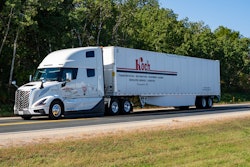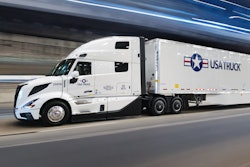By Todd Dills
Projecting a $230 million deficit in the fuel-tax-dependent Highway Trust Fund by the end of fiscal year 2009, U.S. Secretary of Transportation Mary E. Peters outlined the agency’s fiscal year 2008 budget request during a Monday, Feb. 5 teleconference.
More than half the $67 billion total, $42 billion, is for highway safety and construction programs. Of that, less than 1 percent, or $175 million, is for the Congestion Relief Initiative announced in spring 2006, a mostly administrative effort to examine such ideas as public-private partnerships in highway construction.
Included in the congestion package is $25 million to implement the Corridors of the Future program, which encourages public-private partnerships across state lines.
Raising the federal fuel tax is not among the Bush administration’s congestion proposals, but “congestion pricing” is, Peters said – for example, having different toll prices at different times of day to encourage more off-peak traffic on certain routes. “By using tolls or pricing, you can price a more consistent and a better use of the system,” Peters said.
Coming up with alternatives to fuel taxes for highway funding is among the tasks of the National Surface Transportation Policy and Revenue Study Commission, created by Congress in 2005. Peters is a member of that panel, which is required to submit its recommendations by July 1 of this year.
Peters’ budget requests $528 million for the Federal Motor Carrier Safety Administration’s safety improvement initiatives, including $300 million toward tough enforcement of interstate regulations.
Big as it is, Peters’ entire budget is only 2.3 percent of the $2.9 trillion budget President Bush sent to Congress on Monday, Feb. 5. It is the first budget Bush has presented to a Congress not controlled by his fellow Republicans.
The DOT’s Budget in Brief, a 76-page document, is available here as a PDF download.







